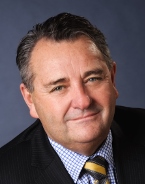Financial institutions and regulators are standing in the way of client-centric reforms, and moves to license individual advisers, in a bid to retain control and promote their own self-interests, according to Connect Financial Service Brokers Chief Executive, Paul Tynan.

Tynan said the Royal Commission and FASEA education proposals will continue to reshape the industry and any change should be focused on putting clients first and moving away the dual level AFSL/adviser licensing system towards licensing advisers.
“This single change will re-energise and refocus the profession, however regrettably this is currently hitting a very major roadblock,” Tynan said.
“The institutions and ASIC are not embracing this client first principle and pushing back as they see this as losing control and is not in their self-interest,” he added.
“I have lost faith in the captains of industry and regulators to put self-interest aside…”
Tynan said key industry leaders were failing to see or admit there was a conflict of interest between advice and product and continue to build advice models based on size which allowed them to compensate consumers for bad advice.
“I have lost faith in the captains of industry and regulators to put self-interest aside and place the welfare of the client first above all,” Tynan said.
He said financial advice was currently caught in a ‘perfect storm’ in which there was “a total lack of understanding and appreciation of the role and importance of the advice sector”.
Tynan added that this disregard when combined with the growing cohort of older advisers, increased education requirement and over compliance and regulation would result in “…an exodus over the next six years of more than 50 per cent of the current force of financial planners”.
“The number of financial planners that will leave the industry cannot be understated and yet the severe impact it will have continues to be ignored,” he said.
The advice sector would, however, struggle to attract new advisers, Tynan said due to “…brand damage and a long and complicated pathway in order to become a fully qualified”.




Agree. There is evidence now of increased activity around selling of businesses plus reduced interest for FP roles. Everyone in the industry should lobby their Federal member – there is an election just round the corner.
Well said Paul.
I would suggest that many advisers in particular, have also lost faith in the “captains of industry and regulators to put self-interest aside and place the welfare of the client first above all….”
The statement, “The number of financial planners that will leave the industry cannot be understated and yet the severe impact it will have continues to be ignored,” is so correct, it is scary! The LIF is not set in concrete. There is always strength in numbers, so I would propose that the major life companies go the government as one and plead
the case on behalf of the retail life industry. Fight against the reduction to commission rates and fight against this evil two year claw back. It has already been reported that new business is down as a result of the LIF. This will continue unless those in a position to do something about it, act! This may involve not only the insurers but the heads of the risk dealer groups. Come on people – all it takes is for one person to get you all together and begin the process. If you don’t, then as Paul says, “the number of financial planners
that will leave the industry cannot be understated
Paul, a lot of what you say has merit, though I fear that individual adviser licensing may strangle the individual adviser with red tape, higher costs and higher risk.
ASIC and copious regulation is not an easy path to tread and unless there was a much much much simpler regulatory environment to work with, advisers may sink.
Most advisers have been cushioned from the complexity and I cannot see the Government or ASIC letting up on regulation, after the Royal commission fiasco’s that have been brought to light.
There are so many vested interest groups that will push back against the status quo, as the meat in the sandwich, also known as the clients and advisers, have very little say in any of the future direction and are also the last to be consulted on what is best for the Industry and the future of advice.
What has been created, is a growing army of regulators and education guru’s, who see blue sky ahead for their job security, while not seeing, that with fewer advisers, the goal of better outcomes for all Australians, will not be met.
Totally concur, when I initially applied for my AFSL the people involved like TRIBECCA [does not exist now] told me clearly that they do not wish to assist me. The business is polluted by the suppliers, as they want to control distribution by FEAR. The adviser network is being driven by the NEW code of using WORDINGS [ code for APL]. The best interest rule has never been a part of Manufacture and AFSL owned by Manufacturer.
Financial planning cannot become a profession, until the adviser is free to set up their own shingle.
Forcing planners to join an AFSL creates an immediate ethical roadblock to the adviser’s actions by inserting an additional, unnecessary layer of obligation – that is in no way related to client best interest, regulatory compliance or advice independence.
Larger institutions may reduce ASIC’s oversight burden but the Royal Commission and just about every investigation ever run, has shown that the conflicts of interest from vertical integration are just too big to make the AFSL system justifiable.
I have operated my business under my own AFSL for many years, as well as under a large AFSL – for a few years – and now under a smaller AFSL, and I can assure you that the larger AFSL did not reduce my administrative burden by even a fraction.
Individual licencing does not stop advisers pooling resources and creating their own integrated back office support system, so efficiencies can still be obtained under an individual licencing system.
At the point where every adviser has a relevant degree, cannot access commissions, has an open APL based on their abilities and scope, and reports directly to ASIC – at that stage, you have a band of professionals.
@ Michael O’Hara,
Your point has a big hole in it.
Here is your first point of conflict if you own your own AFSL.
You may happen to to be the only adviser in the AFSL and the Responsible Officer.
If it’s perceived that you you slipped up and there’s a complaint against you, which role do you play in this little scenario. That’s like being the defendant and the prosecutor in the investigation.
Given the jaundice view and the perception of ASIC and FOS, you might want to talk to someone, who despite doing no wrong, was still required to crawl over bared wire through a minefield, then swim a raging river full of crocodiles and Piranha to rescue an 85 year old spinster from an erupting volcano.
The way forward in my view is for like minded advisers to join a small independently owned AFS Licensee where the culture is shared by the participants, and everyone has a say in how the Licence is run, just like a co-operative.
Why is an AFSL required. If I want to be a lawyer you are admitted to the profession based on the recommendation of the law society. If I want to be an accountant you have to have membership of the institute of chartered accounts (or similar), Even if you want to be in real estate you have to be a member of the RealEstate institute. Why not to be an adviser you have to be a member of the institute of financial planners (new body) – they can control adviser behavior, education standards etc… if they think you are not suitable your’re out. The answer is simple – it is a threat to ASIC’s empire. Paul is on the right track with his thinking but it should go further so we are like other professions – isn’t that what everyone keeps saying. How can you be a profession without a professional body that actually controls your industry as other professions have. It won’t change there is too much politics and too much self interest – from ASIC, the Licences and the mickey mouse so called professional bodies that we must be members of such as the FPA.
There are lessons to be learnt out of the Royal Commission and many advisers are still not listening.
Grandfathered clients must be provided with service and taking a fee and not providing any service is totally unacceptable. We realised this 2 years ago and started reconnecting with client’s that we had not had contact with for more than 10 years. The issue has been small account balances with very little income and our approach is to encourage them to either roll out their balance to another fund, consolidating their super or to come in for a free review with the aim of reactivating our relationship. Most of these clients come from old employer schemes that were very popular during the 1990’s.
We are losing about 90% of these clients, however the 10% that stay are again becoming active clients.
Our profession is changing and our role is not well understood by some advisers, so you can understand why the general public is distrustful of financial advisers. I often hear the comment the financial advice is too expensive or it is just selling products.
Financial advice should be about solving a problem and the financial plan is the road map to financial security. It is all about relationship and mentoring our clients to achieve financial security.
I believe that a financial adviser can service about 100 clients and you should be able to talk to every client at least once every 3 months and review their plan at least annually.
When times are tough, this is when you are needed the most and talking them though these events is very important.
Clients must be actively involved in the risks associated with investing their funds and we need to tell them how much they could lose in a market correction and how long it will take to recover these investments.
To my clients, I talk about income streams and how much capital is required to produce the income stream they need to achieve financial security.
Now what does the future look like?
I believe that accounting practices and financial planning practices will merge.
They will have the resources to meet the compliance obligations and they are very comfortable with fee for service.
They already have a good trust relationship with their clients.
Financial planners should be joining with accountant practices and applying for their own AFSL which they can do right now under the existing rules.
The professions generally group together in a practice as the sole practitioner is at a great disadvantage without the support of fellow professionals.
PS This Royal Commission is producing some very good outcomes, my bank has called me twice in the last 2 months and asked me if they be of any help.The last time this occurred was during the 1980’s.
What now needs to happen is the education of both advisers and the general public to understand the benefits of what sound financial advice. We are dwelling too much on the bad advice or no advice and not talking about those doing the right thing.
William Mills
Price Financial Intelligence Pty Ltd
Comments are closed.